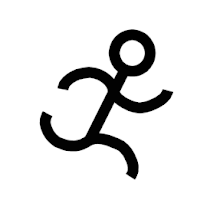Now that the year is over, time to take stock of what I've learned in 2008. 2008 was actually my first complete year of running/triathlon. I participated in many road races, trained and raced in sprint and olympic distance triathlons and ran my first marathon, where I actually qualified for Boston. Surely, I must have learned a few things along the way.
Sure I did, and I'm going to share some of them with you!
It's hard to improve speed and distance at the same time
My experience in 2008 is that once I started my marathon training program, which was done concurrently with triathlon training, my speed leveled off. I didn't lose any, but it stopped improving. Maybe I'm just too old, but I couldn't force myself to move up a notch in the pacing tables. I was able to translate that speed to longer and longer distances though. I finished my half and full marathons at almost exactly the times predicted by my training program.
High volume is not necessary to run a marathon in a decent time
Of course, my decent time can be someone else's worst nightmare, but here I go. Since I was doing triathlon training and therefore had to swim and bike a few times a week, I decided to train for my marathon using a low volume, 4 days/week program. During the 24 week program, only 2 weeks exceeded 50 km of running, 3 if you include the week of the race. I still managed to run under 3:30 and qualify for Boston in my first marathon. Two quality sessions and a long run. Those are the keys.
Higher volume might be a good idea
Although my marathon felt great, it took its toll. It took me a while to recover. I can't help but wonder if higher volumes of training would have helped achieve a faster recovery. I will be testing that hypothesis this year.
Be careful when you choose to give blood
I'm not saying not to do it, I'm just saying to chose WHEN. Don't do it if you're planning on racing hard, or if you need to do some hard training. Don't believe those who say that they don't feel a difference. You can't lose 10% of your oxygen transport system and not feel the effect. Training is all about building up that system. Yes, it will come back but it takes weeks. If you train with a HR monitor, you WILL see a BIG difference. Enough said.
Don't under-estimate the mental toll of training
At the end of the summer, I became quite distraught. I was tired, the training kept becoming harder and harder, I was afraid of getting hurt and worst of all, I was sure I couldn't run my marathon at the pace I was training for. Everything was just so hard. I even emailed Matt Fitzgerald, the author of the training plan I was following (Brain Training for Runners) who graciously answered back with some advice. The thing is, I was physically tired, but mentally I was exhausted. Personally, being a lazy bastard, making myself go out and do those quality sessions, which were VERY hard, day after day just slowly ate at me. For the first time, I didn't feel like running. I took a hard look at my training to make sure I wasn't over-training, decided I wasn't and just kept going. I was a hard patch though.
There's always something that hurts
Looking back in my log, I don't think there's been more than one week where there wasn't some kind of pain somewhere in my body. If it wasn't my calf, it was a hamstring, or blisters, or my quads, or even just some pain "deep inside somewhere". If someone was to follow those "zero-tolerance" advice from some running books, they basically couldn't train or would be limited to a slow shuffle (actually that gives me knee pains).
I think this is enough. Those were the main lessons I remember from last year.

No comments:
Post a Comment